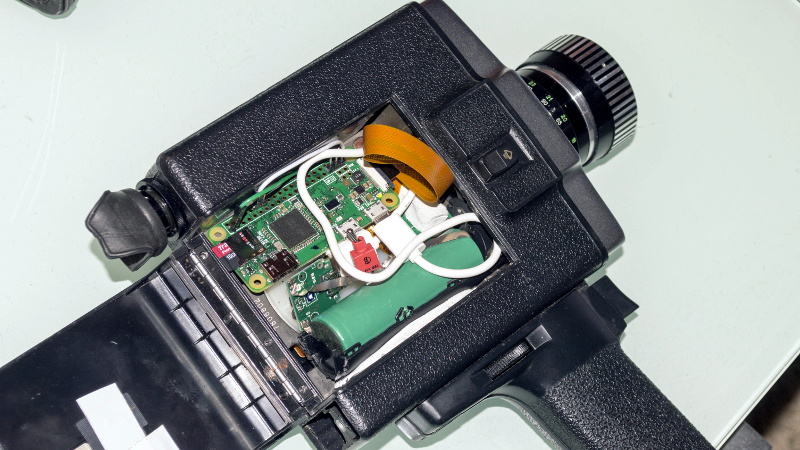A few years ago [Xabier Zubizarreta] got it into his head that he wanted to put a modern digital image sensor into a classic Super 8 camera, but he didn’t want to ruin a gorgeous piece of vintage hardware in the process. After a bit of research, he discovered an export version of the Avrora camera made for the 1980 Summer Olympic Games in Moscow that could be had for cheap. Figuring nobody would miss a camera built with the utilitarian aesthetics you’d expect of a Soviet-era piece of consumer tech, he set off to cram a Raspberry Pi into its film compartment.
On the Hackaday.io page for this project, [Xabier] explains a bit about the optical properties that make this project challenging. Specifically, the miniature sensor used by the official Raspberry Pi camera module is far smaller than the 8 mm film the camera was designed for. So when the sensor placed at the appropriate focal length for the original film, the image will be cropped considerably. As you can see in the video below, this gives the impression of everything being filmed with a fairly tight zoom.
To perform this modification, [Xabier] first had to liberate the sensor of the Pi Camera from the original optics, and then carefully install it in proper position on the Avrora. To make sure he had it aligned, he watched a live feed from the camera while the epoxy holding the sensor down was curing. This allowed him to make slight adjustments before everything was solidified. With the sensor in place, he only had to stuff the Pi Zero and battery pack into the film compartment, and wire the original camera trigger to the GPIO pins so he could read it in software.
Considering the incredible amount of effort some photographers have put in to adapt their vintage cameras to digital, it’s refreshing to see such a straightforward approach. The resulting video might not be up to modern standards, but with projects like this, that’s sort of the point.
















I remember the Digital Super8 project from a few years back which aimed at putting a tiny little Ximea color camera into a Super8 film cartridge, and then using the cartridge with any Super8 camera stock and unmodified. This video shows how the camera is paired with a mobile phone for the controls: https://www.youtube.com/watch?v=_OF_Xd0ItRQ and https://www.youtube.com/watch?v=nvkGuAACrgU
The author of the digital super 8 project, Patrick Steemers, gave the following update a month ago on this video: https://www.youtube.com/watch?v=VUMOPhmBmP4
[…] The digital super 8 cartridge project is at a bit of a ‘stand still’ at the moment. Plans (partially in progress) are: re-design the insides of the cart to accommodate optical lenses to shift the focal plane. So that the cartridge can even fit a camera without the need to take out the film gate of the super 8 camera itself. Furthermore an option is being designed and tested to revert back to having an external small module, connected to the cartridge inside the camera (with only the sensor and trigger sync circuit) with a USB cable through the side window of the camera to connect cartridge and external module. the external module then runs on a raspberry pi 4 which is more powerful than the Nanopi Neo Air we currently use inside the cartridge. The Raspberry Pi4 doesn’t fit in the cartridge but the performance is better. So far with the option the software also runs much more stable.
So as you can read: a lot of plans and engineering ideas and work to be done. Not really capable of lending you the one working prototype because I sometimes partially dissassemle it cause I need some of the parts.
Thanks so much for reaching out and for your ongoing support of this long journey :-)
A soviet RPi? Should be a Распбери Пая or something.
If it sent everything back to Moscow then it would be a Raspberry Spi…. 🕵️
If you were to inspect a value of 3.14159… as it passed through the Serial Peripheral Interface back to Moscow you would spy Raspberry Spi SPI pi!
…I’ll see myself out now…
See yourself out ??? SECURITY. !!!! 😄😄😄
I did it also a few years ago:
https://www.youtube.com/watch?v=J1vF0Zm3EOo
currently working on a new version that should vastly improve on the project.
Did he modify the video? Because if he didn’t it really captures the Super-8 aesthetic. All I can say is “Super”!
He must have as there are film grain artifacts
Definitely, he says on the project page that there’s some filters at work. But it does show how “zoomed” the image looks.
Try the new raspberry pi HQ camera, the sensor is slightly larger than super8 and it can be hacked into a super 8 camera. With wifi you can use your phone as the screen monitor and control, not to complicated.
https://youtu.be/saYVXCY22RE a super 8 hack with a raspberry pi 4 and HQ camera sensor.
That film does actually look kind of vintage… He definitely achieved the desired effect.
I have the same Super 8 camera. are there instructions on how to dismantle them? My lens needs to be cleaned from the inside. there is also something rattling around in the case.